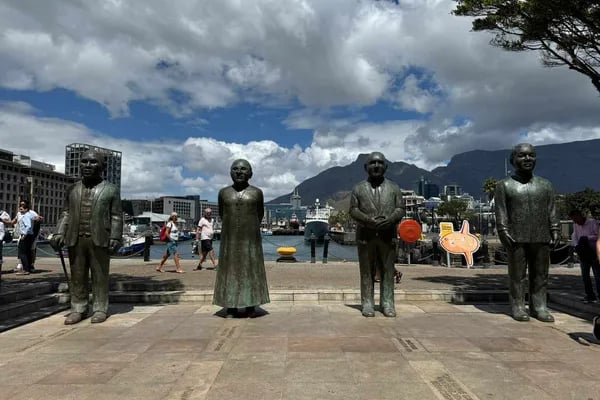Confession time: Cape Town had me at Table Mountain, but it was a malfunctioning cell phone charger and a braai invitation from near-strangers that really swept me off my feet. Over a sun-drenched February week—armed with local friends and a fair bit of wide-eyed curiosity—I fell headlong for the city’s blend of wild scenery, creative energy, and genuine warmth. Yes, there were penguins, but also unexpected load-shedding mishaps, late-night laughter at markets, and meals whose spices lingered well past the last bite. Here’s my honest take—the fascinating, chaotic, and deeply rewarding Cape Town tourists don’t always see.
Lost and Found in the Table Mountain Shadow: When Planning Fails, Magic Begins
My Cape Town adventure began with a lesson in humility—a reminder that even seasoned travelers can trip over the smallest details. Despite years of international travel, I landed late in South Africa, all thanks to a simple oversight: U.S. passport holders must have two consecutive blank visa pages (not endorsements) and at least 30 days’ validity after their intended exit. I’d missed this fine print, and my arrival was delayed by several days. If you’re traveling to Cape Town from the US, double-check your passport before you book that flight. It’s a small step that can save you a world of headache.
First Encounters with Load-Shedding: The ESP App to the Rescue
Arriving in Cape Town, I was quickly introduced to a uniquely South African reality: load-shedding. This scheduled power outage system divides the city into 23 zones, each affected at different times. On my first evening, the lights flickered and died just as I was unpacking. My local friend Abbey Hudetz, a New Yorker-turned-Capetonian by marriage, had warned me:
“I always tell visitors to download the load-shedding app, or you’ll get caught off guard.”She was right. The ESP load-shedding app became my secret weapon, letting me check outage schedules by neighborhood and plan my days around the blackouts. It’s a must-have for anyone visiting Cape Town in 2025 and beyond—especially if you’re working remotely, have evening plans, or just want to avoid cold showers.
Getting Around: Uber, Not Taxis, and the Art of Blending In
One of the best Cape Town travel tips for 2025 is to use Uber. It’s more affordable and reliable than local taxis or buses, especially during load-shedding when traffic lights and gas stations can be affected. My local friends insisted on Uber for every outing, and I quickly understood why. The app’s live tracking and cashless payment added a layer of safety and convenience that made exploring the city stress-free.
But safety in Cape Town is about more than just your ride. Matt, Abbey’s husband, gave me a tip that proved invaluable: blend in. Cape Town is welcoming, but standing out with flashy clothes or expensive gear can make you a target for petty crime. I swapped my usual travel backpack for a simple tote, left jewelry at home, and kept my phone tucked away in public. These small changes made me feel less conspicuous and more at ease, especially when wandering through busy markets or unfamiliar neighborhoods.
Cape Town Safety Tips for Travelers
- Keep valuables secure and out of sight in public spaces.
- Avoid flashy clothing or accessories that draw attention.
- Use Uber instead of hailing taxis on the street.
- Download the ESP load-shedding app to stay informed about power cuts.
- Listen to local advice—Capetonians are friendly and happy to help.
When Plans Go Sideways, Cape Town Delivers Magic
Despite my best-laid plans, Cape Town had its own ideas. A delayed arrival, sudden power outages, and shifting schedules could have ruined my week. Instead, these hiccups became the backdrop for some of my most memorable moments. I found myself sharing candlelit cocktails at The Gin Bar during a blackout, joining spontaneous sunset gatherings on Clifton Beach, and laughing with locals at the Oranjezicht Night Market when the lights flickered out. Each unplanned detour led to new friends, hidden gems, and a deeper connection to the city’s rhythm.
Traveling in Cape Town means embracing the unexpected. With the right tools—like the ESP app, Uber, and a flexible mindset—you’ll find that when planning fails, the real magic begins. The city’s beauty, warmth, and resilience shine brightest when you let go of control and follow where the moment leads.
Beyond Penguins and Postcards: The True Colors of Cape Town’s Hidden Corners
When most travelers picture Cape Town, they imagine the classic postcard scenes: penguins waddling along Boulders Beach, the rainbow-hued houses of Bo-Kaap, or the cable car gliding up Table Mountain. But as someone who’s explored 53 countries and called five home, I can say with certainty that the city’s real magic lies in its lesser-known corners—those places and moments only locals or the well-guided ever find. My week in Cape Town, guided by Abbey Hudetz (“Cape Town is a tourist destination that has it all: mountains, beach, and city.”), her Capetonian husband Matt, and Michaela Abrahamse, a native now living in New Zealand, revealed a side of the city that goes far beyond the guidebook. Here’s how to experience the hidden gems in Cape Town, from Stellenbosch wine country tours to secret beaches and buzzing local markets.
Stellenbosch Wine Country: A Taste of Agro-Tourism Bliss
Just 45 minutes from Cape Town by Uber, Stellenbosch wine country is a world away from the city’s bustle. While many tourists stick to the big-name estates, Abbey steered me toward Babylonstoren, a working farm that feels more like an agro-tourism amusement park than a traditional winery. Here, you can wander through lush gardens, taste fresh produce, and sample award-winning wines—all while soaking up views of the Simonsberg mountains. The on-site Babel restaurant is a must for farm-to-table dining, and the property’s peaceful pastures invite you to slow down and savor the moment.
Other local favorites include Boschendal—perfect for picnics under ancient oaks—and the serene Leeu Estates, where art, wine, and nature blend seamlessly. Stellenbosch wine country tours offer more than just tastings; they’re an invitation to experience the region’s agricultural heritage and creative spirit. For 2025, many estates are expanding their outdoor activities, from guided garden walks to cycling trails, making this area a top pick for those seeking Cape Town beaches and outdoor activities beyond the coast.
Clifton & Cosy Bay: Cape Town Beaches and Outdoor Activities Off the Radar
While Camps Bay and Muizenberg draw the crowds, locals know that the real beach magic happens at Clifton and Cosy Bay. The four Clifton beaches each have their own personality: Clifton 3rd is a welcoming spot for the LGBTQ community, while Clifton 4th is popular with families and groups of friends. As the sun dips, the sand comes alive with spontaneous volleyball matches, local musicians, and sunset picnics—a true taste of Cape Town’s laid-back, social energy.
For those craving solitude, Cosy Bay is a hidden cove tucked between boulders, accessible only by a short walk. It’s the kind of place where you can swim in clear water, nap on sun-warmed rocks, and feel like you’ve stumbled onto your own private paradise. These beaches are prime examples of Cape Town’s outdoor activities that rarely make it into mainstream travel guides, yet offer some of the city’s most memorable moments.
Oranjezicht City Farm Night Market: Where Cape Town’s Creative Pulse Beats
Markets are the heartbeat of Cape Town’s local culture, and while the Old Biscuit Mill in Woodstock is a classic, the Oranjezicht City Farm Night Market at the V&A Waterfront quickly became my favorite. Under strings of fairy lights, the market buzzes with energy: gourmet food stalls serve everything from Cape Malay curries to vegan sushi, artisans display handmade jewelry and ceramics, and live music drifts through the air.
Unlike the more touristy markets, Oranjezicht draws a crowd of locals—young professionals, families, and creatives—making it the perfect place for chance encounters and people-watching. It’s also a fantastic spot for solo travelers; I struck up conversations over craft gin and locally roasted coffee, and left with both unique souvenirs and new friends. For those planning a trip in 2025, this market is a must for anyone seeking authentic local markets in Cape Town and a taste of the city’s thriving food scene.
Cape Town Travel Tips 2025: Local Wisdom for a Seamless Adventure
- Download the ESP load-shedding app to navigate scheduled power outages.
- Use Uber for safe, affordable transport—especially during load-shedding.
- Pack a reusable water bottle; Cape Town’s tap water is safe and eco-friendly.
- Dress simply and keep valuables close in public spaces.
- Check passport requirements carefully—two consecutive blank pages are a must for U.S. travelers.
Exploring Cape Town through local eyes means trading the obvious for the extraordinary—whether it’s sipping wine in a sun-dappled vineyard, joining a beach volleyball game at sunset, or browsing a night market under the stars. These hidden gems in Cape Town are where the city’s true colors shine brightest.
Traditions, Tastes, and Quirks: When Culture Invites You In
There’s a certain magic to Cape Town that goes beyond its dramatic scenery and famous attractions. What truly drew me in was the city’s living culture—woven from traditions, tastes, and quirks that reveal themselves when you’re welcomed by locals. My week in Cape Town, guided by friends who call the city home, became a masterclass in the best local experiences in Cape Town, from the ritual of a traditional South African braai to the powerful stories held in its cultural heritage sites.
My initiation into the traditional South African braai experience was both a culinary adventure and a lesson in community. The braai is more than just a barbecue; it’s a cherished ritual where friends and family gather, each bringing their own cuts of meat—often sourced from Woolworths, the local answer to Whole Foods. The Braai Master, a role Abbey took on with pride, presides over the fire, relighting it with the iconic Lion matches if the flames falter. I was handed the tongs and tasked with grilling boerewors, a spiced sausage that’s a national favorite. The air filled with the scent of sizzling meat and Cape Malay spices, while laughter and stories flowed as freely as the local wine. The meal ended with malva pudding—a sweet, sticky dessert served warm with vanilla ice cream, and a staple at any authentic South African gathering. Even if you don’t have friends in town, joining a braai tour is one of the best ways to experience this tradition firsthand.
Hospitality in Cape Town is as spontaneous as it is sincere. Michaela, who grew up here, shared how her family would often invite strangers met at the supermarket over for dinner. “Somehow, the sun is brighter, the grass is greener, and the people are always ready to welcome you,” she told me. I found this openness everywhere—from friendly chats at the Oranjezicht City Farm Night Market to the easy camaraderie at Clifton’s sunset gatherings. Even something as simple as Cape Town’s safe tap water became a point of connection. Locals are proud of it, and sharing a refill at a café or market stall became a small but meaningful eco-friendly travel ritual, reinforcing the city’s green spirit and my own commitment to sustainability.
To truly understand Cape Town, I knew I had to look beyond its surface beauty and explore its cultural heritage sites. The District Six Museum stands as a moving memorial to more than 60,000 residents forcibly removed during apartheid. Walking through its exhibits, I was struck by the resilience and hope that still define the community. A township tour of Langa deepened my appreciation for the city’s complex history and vibrant present. Guided by locals, I learned how art, music, and entrepreneurship are helping to shape a new narrative—one rooted in dignity and connection. These experiences were not just educational, but transformative, reminding me that Cape Town’s story is as much about its people as its places.
What sets Cape Town apart is how these traditions, tastes, and quirks invite you in. Whether you’re grilling boerewors as the Braai Master, sharing a glass of Stellenbosch wine at a sunset picnic, or listening to stories in Langa, you become part of a living tapestry. The city’s rituals of hospitality—impromptu dinners, market gatherings, and even eco-friendly habits like carrying a reusable water bottle—make every moment feel personal and authentic.
As my week drew to a close, I realized that Cape Town’s greatest gift is its ability to turn visitors into friends. The synergy of awe-inspiring landscapes, rich traditions, and open-hearted people creates an experience that lingers long after you leave. For anyone seeking the best local experiences in Cape Town—where every meal, every story, and every sunset is an invitation—this city is simply unrivaled. Cape Town doesn’t just welcome you; it makes you feel at home.




